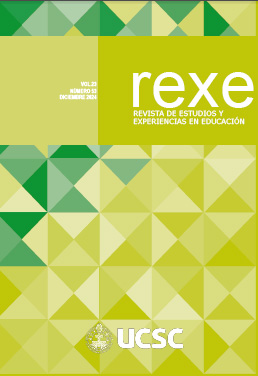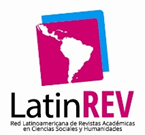Rethinking the training process in intermediate practices of Social Work at the University of Atacama, Chile.
DOI:
https://doi.org/10.21703/rexe.v23i53.2158Keywords:
Training - social work, Intervention, Pandemic, Distance educationAbstract
Faced with the health contingency that began in March 2020, the University of Atacama adapts its work to the measures imposed by the respective authority. In tune, the social work department makes adjustments to the intermediate internship process, incorporating temporary modifications that make it possible to respond, in this extraordinary context, to the training objectives and the demands of the environment. The article presents the results of a descriptive and mixed case study that analyzes the Micro intermediate practice process of the Social Work career in the context of Covid-19. For this, the adjustments made in the process are defined and the assessment of the experience as an instance of intervention in the context of a pandemic is established, from the student body and the teaching staff. The results indicate the strengthening of teamwork and networking, increased instances of reflection on the right to assistance and social ties and training in social benefits and the establishment of intervention flows adjusted to the context of confinement as the main elements added to the process and appreciated by its actors. In conclusion, learning is recognized that becomes challenges to develop around the installation of virtual media in social intervention, the ability to systematize experiences and promote intentional, interconnected and inter-institutional work. In addition, and in relational terms, the importance of the role of teacher guide in the emotional containment and management of student frustration is established.
Downloads
References
Aguayo C. y Marchant P. (2021). Construcción de competencias éticas para la formación universitaria en trabajo social. Perfiles educativos, 43(171), 102-118. https://doi.org/10.22201/iisue.24486167e.2021.171.59678 DOI: https://doi.org/10.22201/iisue.24486167e.2021.171.59678
Alayón, N. (2021). El derecho a la asistencia. Columna de opinión. https://www.pagina12.com.ar/46398-las-pensiones-como-materia-de-ajuste
Bogo, M. (2015). Field education for clinical social work practice: Best practices and contemporary challenges. Clinical Social Work Journal, 43(3), 317-324. https://doi.org/10.1007/s10615-015-0526-5 DOI: https://doi.org/10.1007/s10615-015-0526-5
Concha-Toro, M., Anabalón, Y., Lagos, N., y Mora, M. (2020). Prácticas profesionales y Trabajo Social. Una revisión de la literatura en educación superior. Pensamiento educativo, 57(1), 1-19. https://dx.doi.org/10.7764/pel.57.1.2020.5 DOI: https://doi.org/10.7764/PEL.57.1.2020.5
Fernández, A. y Durán, D. (2020). Actuar-Enseñar entre la Diversidad: Construyendo Educación Inclusiva en Atacama. Revista Internacional De Educación Para La Justicia Social, 9(2), 71–88. https://doi.org/10.15366/riejs2020.9.2.004 DOI: https://doi.org/10.15366/riejs2020.9.2.004
Fumasoli, T. y Stensaker, B. (2013). Estudios organizacionales en la educación superior: una reflexión sobre temas históricos y tendencias prospectivas. High Educ Policy 26, 479–496. https://doi.org/10.1057/hep.2013.25 DOI: https://doi.org/10.1057/hep.2013.25
García, N. (2023) Implicaciones del trabajo en primera línea de atención ante la pandemia por Covid-19: experiencias desde trabajo social. En Berenice Pérez y Norma Cruz (Coord.). La intervención encarnada, (pp. 267-281).
Gómez, M. (2022). Inclusión y diversidad en el trabajo social: Desafíos y oportunidades. Revista Latinoamericana de Trabajo Social, 8(1), 45-58.
González, A. (2015). Estrategias metodológicas para la investigación del usuario en los medios sociales: análisis de contenido, teoría fundamentada y análisis del discurso. Profesional De La Información, 24(3), 321–328. https://doi.org/10.3145/epi.2015.may.12 DOI: https://doi.org/10.3145/epi.2015.may.12
Gorichon, S., Pérez, A., Yáñez, M., y Roberts, M. (2020). Supervisión y acompañamiento de prácticas profesionales. Desarrollo de un enfoque de reflexividad práctica desde un self-study colaborativo. Revista Iberoamericana De Educación, 82(1), 31–50. https://doi.org/10.35362/rie8213682 DOI: https://doi.org/10.35362/rie8213682
Grajek, S. (2019). Top 10 IT Issues 2020: The Drive to Digital Transformation Begins. https://er.educause.edu/-/media/files/articles/2020/1/er20sr201.pdf
Guzmán, D. y Castillo, A. (2022). Cambios en la estrategia de enseñanza-aprendizaje: desafíos en la práctica docente desde análisis de carrera universitaria chilena. Revista Educación, 46(1), 263-279. http://doi.org/10.15517/revedu.v46i1.45593 DOI: https://doi.org/10.15517/revedu.v46i1.45593
Hernández, R., Fernández, C. y Baptista, P. (2014). Metodología de investigación. Editorial McGraw-Hill.
Hodges, Ch., Moore, S., Lockee, B., Trust, T., y Bond, A. (2020). The Difference Between Emer-gency Remote Teaching and Online Learning. Educause Review. Entrevista publicada. ht-tps://er.educause.edu/articles/2020/3/the-difference-between-emergency-remote-tea-ching-and-online-learning
Lacomba, J., (2020). Una revisión del Trabajo Social con migrantes y refugiados. Construyendo nuevas bases teóricas y metodológicas. Ehquidad: La Revista Internacional de Políticas de Bienestar y Trabajo Social, (14), 293-332.
Martínez, V. y Cerros, E. (2020). La formación profesional del Trabajador Social en México: una revisión del currículo actual. Interacción y Perspectiva: revista de Trabajo Social 10(1), 66-79.
MIDESO, Ministerio de Desarrollo Social. (2020). Informe de Desarrollo Social 2020. https://www.desarrollosocialyfamilia.gob.cl/storage/docs/Informe_de_Desarrollo_Social_2020.pdf
Molina, C. (2018). Promoviendo la reflexión crítica en la formación de estudiantes de trabajo social. Cuadernos de Trabajo Social, 31(2), 123-137.
Navarrete, O., y Véliz, C. (2021). Prácticas docentes en Trabajo Social: tensiones y desafíos de la formación profesional. TS Cuadernos De Trabajo Social, (21), 1 - 13. https://www.tscuadernosdetrabajosocial.cl/index.php/TS/article/view/178
Ornelas, A. (2022). La intervención de Trabajo Social durante la pandemia por COVID-19.: Una recuperación de la micro-actuación profesional. Itinerarios De Trabajo Social, (2), 69–78. https://doi.org/10.1344/its.i2.36873 DOI: https://doi.org/10.1344/its.i2.36873
Parola, R. (2020). Problematizando las Prácticas pre profesionales en Trabajo Social. Desafíos y perspectivas. Prospectiva, (29), 73-88. https://doi.org/10.25100/prts.v0i29.8714 DOI: https://doi.org/10.25100/prts.v0i29.8714
Sandoval, C. H. (2020). La Educación en Tiempo del Covid-19 Herramientas TIC: El Nuevo Rol Docente en el Fortalecimiento del Proceso Enseñanza Aprendizaje de las Prácticas Educativa Innovadoras. Revista Docentes 2.0, 9(2), 24–31. https://doi.org/10.37843/rted.v9i2.138 DOI: https://doi.org/10.37843/rted.v9i2.138
SES, Superintendencia de Educación Superior de Chile. (2020). Plan especial de fiscalización de las medidas adoptadas por las instituciones de educación superior en el contexto de la emergencia sanitaria producida por el COVID-19. https://www.sesuperior.cl/wp-content/uploads/2020/10/Plan-Especial-Fiscalizaci%C3%B3n-Covid19_informe-consolidado-25092020-2.pdf
SES, Superintendencia de Educación Superior de Chile. (2022). Reporte resultados del Plan de fiscalización covid-19, año 2021. https://sesuperior.cl/wp-content/uploads/2022/08/REPORTE-FINAL-PLAN-DE-FISCALIZACION-Marzo-2022.pdf
Sierra, R. (1998). Técnicas de investigación social: teoría y ejercicios. Paraninfo (14a ed., rev.), 283-304.
Universidad de Atacama. (2020). Guía de Orientación: Desde la modalidad presencial hacia la modalidad online. Documento de trabajo.
Vallejos, R. M., y Palma, M. (2023). Prácticas profesionales de futuros profesores en la crisis sanitaria COVID-19: aprendizajes y experiencias desde la perspectiva de estudiantes de pedagogía y de profesores mentores del sistema escolar. REXE- Revista De Estudios Y Experiencias En Educación, 22(48), 345–357. https://doi.org/10.21703/0718-5162.v22.n48.2023.020 DOI: https://doi.org/10.21703/0718-5162.v22.n48.2023.020
Van-Dijk, T. A. (2017). Análisis Crítico del Discurso. Revista Austral De Ciencias Sociales, (30), 203–222. https://doi.org/10.4206/rev.austral.cienc.soc.2016.n30-10 DOI: https://doi.org/10.4206/rev.austral.cienc.soc.2016.n30-10
Downloads
Published
Issue
Section
License
Copyright (c) 2024 Daniela Guzmán-Sanhueza, Adriana Fernández-Muñoz , Ana Castillo-Leyton

This work is licensed under a Creative Commons Attribution 4.0 International License.
Open Access Policy
This journal provides immediate open access to its content, based on the principle that offering the public free access to research fosters greater global knowledge exchange.
License
The REXE Journal, “Journal of Studies and Experiences in Education,” published by the Faculty of Education at the Universidad Católica de la Santísima Concepción, is distributed under a License. Creative Commons Atribución 4.0 Internacional.






